2021牛津译林版选修十unit1《buildingthefuture》word教案
高三英语牛津译林版选修十Unit1 《building the future》Vocabulary教学课件(共39张PPT)
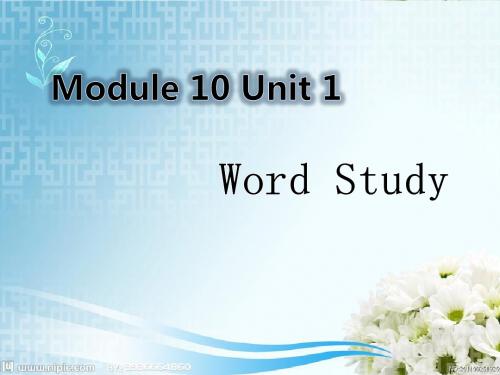
short-term adj. long-term adj. rainfall n. housewife n. problem-solving n. oilfield n. statesman n. grandchild n. 短期的,近期的 长期的,长远的 降雨;降雨量 家庭主妇 解决问题 油田 政治家 (外)孙子(女)
2. adjustment
You can do nothing but adjust adapt yourselves to the fierce competition.
adjust oneself to (doing) sth 使自己适应· · · · · · adapt oneself to (doing) sth make adjustments to sth 对· · · · · · 作出调整
fascinated a.
有趣的;有吸引力的 fascinate v.
Fill in the blanks with the given words. Change the form when necessary.
expense weaken fashion creativity politician
Have a brief look at ‘strangers’.
enterprise n. 企业;经济活动 adj. 暂定的;踌躇的
tentative
dilemma wrestle squeeze deposit
n. (进退两难的)窘境,困境
v. 努力解决或制服 n. 摔跤比赛
v. 挤压; 挤出 n. 拮据, 经济困难 v. 使沉积; 存钱 n. 沉积物;存款
牛津译林版 选修十 Unit 1 Building the future 课件

As the presentative of youth in the UN, Wang Yuan is going to make a speech concerning his opinions about relieving poverty in Africa. He posted this message on the Internet, hoping that anyone with unique ideas can send his writing to him. Please leave Wang Yuan a personal message about your opinion on possible solutions . (At least two linking words should be used in your writing)
The African governments have not existed for a very long time.
As a result, Africa is home to the highest birth rate.
succh as nutrition, clean water, shelter and more.
structure clearer.
Half of the African population lives in poverty. such as nutrition, clean water, These people do not have access to basic shelter and more. human needs,
education for woman
problems?
牛津译林版选修十unit1《buildingthefuture》word单元学案
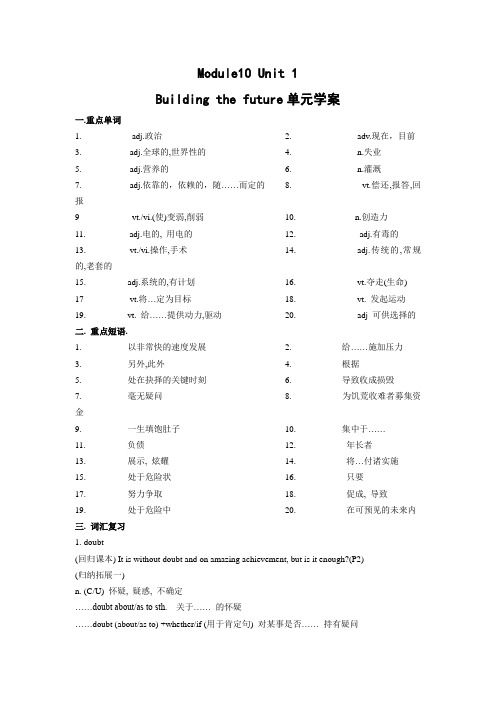
Module10 Unit 1Building the future单元学案一.重点单词1.___________ adj.政治2. ______________ adv.现在,目前3. __________ adj.全球的,世界性的4. ______________ n.失业5. __________ adj.营养的6. ______________ n.灌溉7. __________ adj.依靠的,依赖的,随……而定的8. ______________ vt.偿还,报答,回报9____________vt./vi.(使)变弱,削弱10. _____________n.创造力11.__________adj.电的, 用电的12.______________ adj.有毒的13.__________vt./vi.操作,手术14.______________adj.传统的,常规的,老套的15._________ adj.系统的,有计划16.______________vt.夺走(生命) 17__________ vt.将…定为目标18. _____________ vt. 发起运动19._________ vt. 给……提供动力,驱动20. _____________ adj 可供选择的二. 重点短语.1. __________以非常快的速度发展2. ___________给……施加压力3. __________另外,此外4. ___________根据5. __________处在抉择的关键时刻6. ___________导致收成损毁7. __________毫无疑问8. ___________为饥荒收难者募集资金9. __________一生填饱肚子10. __________集中于……11. _________负债12. ___________年长者13. _________展示, 炫耀_ 14. ___________将…付诸实施15. _________处于危险状16. ___________只要17. _________努力争取18. ___________促成, 导致19. _________处于危险中20. ___________在可预见的未来内三. 词汇复习1. doubt(回归课本) It is without doubt and on amazing achievement, but is it enough?(P2)(归纳拓展一)n. (C/U) 怀疑, 疑惑, 不确定……doubt about/as to sth. 关于…… 的怀疑……doubt (about/as to) +whether/if (用于肯定句) 对某事是否…… 持有疑问…… doubt that (用于否定/疑问句) 怀疑……(以练促记) 根据所学知识完成下列句子.I ______ his words. 对于他的话是否真实我有些怀疑._______ he is the best man for the job. 他是不是担任那项工作的最合适人选,有些怀疑._______ his success. 毫无疑问, 他一定会成功._______ we did the right thing. 毫无疑问我们做得对.(归纳拓展二)beyond/out of doubt(副) 毫无疑问地, 确实地in doubt(形) 不肯定,不确定no doubt(副) 确实地,必定地without doubt(副) 无疑地, 必定地(归纳拓展三)vt. 怀疑, 疑惑, 不相信doubt + n. doubt + whether/if (用于肯定句) doubt + that (用于否定/疑问句) (以练促记) 根据所学知识完成下列句子.________________________. 似乎没有理由怀疑她所说的话.______________ he will keep his word.我怀疑他是否回遵守诺言.I ____________ she would come.我从未怀疑过她会来.(重点提示)doubt 无论是作名词还是动词用,用在否定/疑问句中后面如接that 从句; 作动词用时, 在肯定句中后接whether/if 从句, 作名词用; 否定句中有接whether 从句只能用于肯定句.(归纳拓展四)adj. doubtful 在怀疑的,不确定的doubtful about (doing) sth. 不确定, 怀疑doubtful whether/if/that 未必; 难说; 不大可能2. on top of(回归课本) On top of this, according to the United Nations, hunger and malnutrition claim ten million lives every year.(P2)(归纳拓展一)prep. on top of 除此之外,而且on (the) top of 在……上面(以练促记) 根据所学的知识完成下列练习.He lost his wife _________ he got ill. 他的妻子过世, 更糟的是, 他自己又生病了.He put his books______________. 他把他的书放在她的上面.(归纳拓展二)on top adj./adv. 在上面on top of the world adj. 非常幸福的from top to toe/bottom adv. 从头到脚3. claim (回归课本) hunger and malnutrition claim……(P2)(归纳拓展一)claim sth 值得,需要,夺去生命,要求sb claim (that) 声称…… ;断言sb claim to do 声称曾经……(以练促记) 根据所学知识完成下列练习.The earthquake __________.那次地震夺走了数千条人命.They ______________.他们要求报酬.He claimed (that) he had seen the picture.= He ___________ the picture.他声称他曾看过这幅画.(归纳拓展二)n. © 要求, 主张(C/U) (要求的) 权利,资格make a claim 提出主张/要求give up a claim 放弃要求4. target (回归课本) …… which targets people most at risk (P2)(归纳拓展一)vt. target sb./sth. 把….. 作为目标Our bombers went out today to target the enemy airport. 我军轰炸机今天出击, 以敌人的机场作为轰炸目标.(归纳拓展二)n. © 靶子, 目标an easy target 容易击中的目标;容易受攻击的人5. alone (回归课本) …… food aid alone is not enough……(P3)(归纳拓展一)adj. 只有……; 仅仅……(以练促记) 根据所学知识完成下列练习.You cannot _____________. 你不能单靠吃肉生活._____________ answer the question. 只有她能回答这个问题.(重点提示) 当alone 作此意解时, 只能置于相关名词或代词之后,而only 只能作前置定语.(归纳拓展二)adj./adv. 独自的,孤独的,单独的(辨析比较)alone 作形容词用,意思为“单独,独自一个人”, 不带感情色彩.lonely只作形容词用,意思为“孤独的,寂寞的”, 表示主观上“孤独,寂寞”,可作定语,也可作表语.(注意) 作形容词时, alone 不能和very 连用,应要说much alone, very much ;而lonely 则可以受very 的修饰.(归纳拓展三) leave/let…… alone 不理会6.go (回归课本) There is a saying that goes……(P3)(归纳拓展一)vi.(文句等) 表达为…… + (ad v.) 流传, (谣言等) 散布+ (adv.) (事情)进展,进行+ (adv.)(机械等) 动, 运转+ (adv.) (通道等) 通, 达, 延及+ (adv.)( 不可用进行时)(以练促记) 根据所学知识完成下列练习.___________________. 他所说的话在此地流传.His lecture _______________. 他的演讲进行顺利.I dropped my watch and now ______________. 我的手表掉在地上, 现在不走了.This route ________________. 这条路线延伸到东部.(辨析比较)go, read, say, writego 意为“(文句等)表达为……”, 强调(诗或歌中词/调) 唱,说或指(故事等)发生情况如何, 如,How does that song go? 那首歌怎么唱?The story goes that she’s been married five times. 据传她结过五次婚.read意为“ 应读作,写着,写成是……”, 强调的是“告示,信或段落等书写的内容.如,The sign read “No admittance”.告示牌上写着"禁止入内”.I’ve changed the last paragraph. It now reads as follows……我已经修改了最后一段,现在是这样写的……say 意为“写道,说,指示”,强调“ 书面材料或可见的东西” 所提供的信息,很多情况下能与read 连用.The notice said “Keep out”.告示上写着“禁止入内”.The clock sai d three o’clock.时钟显示三点整。
牛津译林版 选修十 Unit 1 Building the future 课件
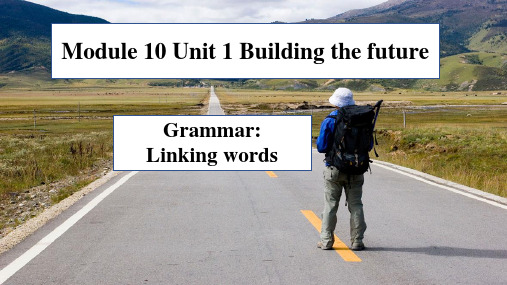
Poverty is not a simple concept.
poor education
lack of food
poor housing
Half of the African population lives in poverty. These people do not have access to basic human needs,
to begin with also
as a result
instead
in addition firstly
such as therefore
however for instance
time sequence: cause and effect:
contrast: addition: example:
a very long time.
African countries had independent
ห้องสมุดไป่ตู้
governments.
Worldwide poverty is declining.
However, the decline of the number of poor people in Africa is slower than the global rate.
Module 10 Unit 1 Building the future
Grammar: Linking words
What do you think of when talking about Africa?
no access to clean water over population muddy road
The average woman living in some parts of As a result, Africa is home to the Africa will give birth to 5.2 kids in her lifetime. highest birth rate.
牛津译林版英语高三Module 10《unit 1 building the future》word教案
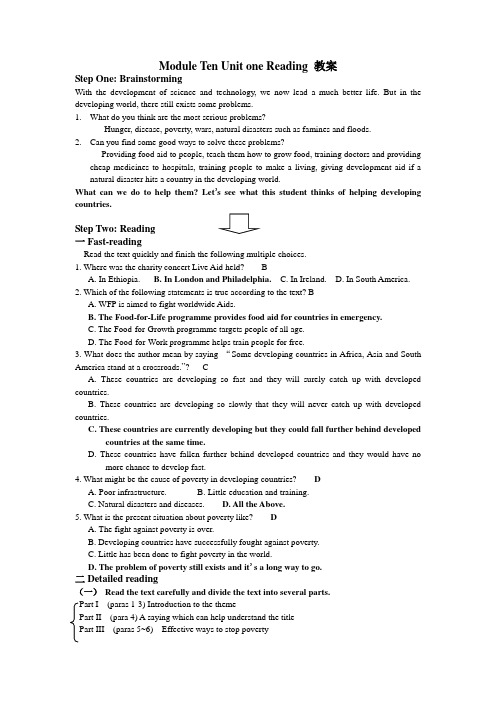
Module Ten Unit one Reading 教案Step One: BrainstormingWith the development of science and technology, we now lead a much better life. But in the developing world, there still exists some problems.1.What do you think are the most serious problems?-----Hunger, disease, poverty, wars, natural disasters such as famines and floods.2.Can you find some good ways to solve these problems?----Providing food aid to people, teach them how to grow food, training doctors and providing cheap medicines to hospitals, training people to make a living, giving development aid if a natural disaster hits a country in the developing world.What can we do to help them? Let’s see what this student thinks of helping developing countries.Step Two: Reading一Fast-readingRead the text quickly and finish the following multiple choices.1. Where was the charity concert Live Aid held? BA. In Ethiopia.B. In London and Philadelphia.C. In Ireland.D. In South America.2. Which of the following statements is true according to the text? BA. WFP is aimed to fight worldwide Aids.B. The Food-for-Life programme provides food aid for countries in emergency.C. The Food-for-Growth programme targets people of all age.D. The Food-for-Work programme helps train people for free.3. What does the author mean by saying “Some developing countries in Africa, Asia and South America stand at a crossroads.”? CA. These countries are developing so fast and they will surely catch up with developed countries.B. These countries are developing so slowly that they will never catch up with developed countries.C. These countries are currently developing but they could fall further behind developedcountries at the same time.D. These countries have fallen further behind developed countries and they would have nomore chance to develop fast.4. What might be the cause of poverty in developing countries? DA. Poor infrastructure.B. Little education and training.C. Natural disasters and diseases.D. All the Above.5. What is the present situation about poverty like? DA. The fight against poverty is over.B. Developing countries have successfully fought against poverty.C. Little has been done to fight poverty in the world.D. The problem of poverty still exists and it’ s a long way to go.二Detailed reading(一)Read the text carefully and divide the text into several parts.Part I (paras 1-3) Introduction to the themePart II (para 4) A saying which can help understand the titlePart III (paras 5~6) Effective ways to stop povertyPart IV (para 7) Conclusion: teach a man to fish(二) Read each part separately.Part One1. Answer the following questions.1) Why was the Live Aid concert so important?----Because it raised $100million for famine victims in Ethiopia and also raised public attention. It also put pressure on politicians to do something about the famine.2) What has the United Nations done to fight the problem of world hunger?----In 1963, the United Nations set up the World Food Programme aiming to reduce the problem of world hunger. A number of programmes have been organized and the WFP has helped more than one billion people around the world.2. SummarizingLive Aid concert---Food aid & famine relief funding ---- Individual aidFood-for-Life food aid WFP Food-for-Growth ----- International aidFood-for-WorkPart Two1. What’s the function of Paragraph 4?A. concludingB. LinkingC. supporting2. Why is food aid alone not enough to help poor countries?----Because the poverty still exists after the food has been eaten up.Part Three1. Answer the following questions.1) What things are included in the infrastructure of a country?----Things like transport, irrigation, electricity, postal service, telephones and schools are included.2) What is the long-term solution to the problem of poverty?----Development aid together with food aid.3) Why is education and training for young people in developing countries so important? ----Because the future of developing countries lies in the hands of young people.2. Summarizing :Improve a country’s infrastructure. Education and training for the young people. Part Four It is better to teach a man to fish than to give him a fish.independent 10. educate 11. train 12. lies 13. achievements 14. over 15. combined Step Four Finish Parts and E on page 4 and 5.。
牛津译林版选修十unit1《buildingthefuture》word教案2
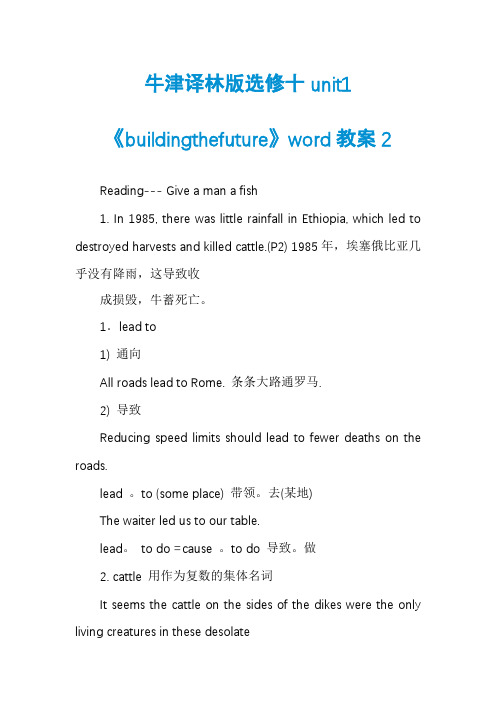
牛津译林版选修十unit1《buildingthefuture》word教案2Reading--- Give a man a fish1. In 1985, there was little rainfall in Ethiopia, which led to destroyed harvests and killed cattle.(P2) 1985年,埃塞俄比亚几乎没有降雨,这导致收成损毁,牛蓄死亡。
1.lead to1) 通向All roads lead to Rome. 条条大路通罗马.2) 导致Reducing speed limits should lead to fewer deaths on the roads.lead 。
to (some place) 带领。
去(某地)The waiter led us to our table.lead。
to do =cause 。
to do 导致。
做2. cattle 用作为复数的集体名词It seems the cattle on the sides of the dikes were the only living creatures in these desolate2. The concert took place on 13 July 1985 in two locations―in London and in Philadelphia―and included the biggest stars of the time.(P2) 1985年7月13日,音乐会在伦敦和费城两地举行,出席者包括了当时最红的巨星。
politicians and malnutrition.(P2) 音乐会还受到了全世界的极大关注,这给政客们施加了巨大压力,迫使他们为这次饥荒做一些事情。
put pressure on 给。
施加压力Do not put much pressure on the handle, it may break.不要在把柄上太用力了,它会坏的。
英语:unit1-《building-the-future》reading课件(1)(译林牛津版选修10)

Useful expressions
1. destroyed harvests 1.收成毁损 2.提高公众对饥荒的意识 aise public awareness of the famine 3. famine relief funding 3.饥荒救济基金 4.受到关注 4. receive much attention 5. put /place pressure on 5.施加巨大压力 6.除此以外 6. on top of this 7.夺走一千万人的生命 7. claim ten million lives
malnutrition solution unemployed food aid success
victories developing long-term hunger crisis
developing world, many In the 1.__________ malnutrition This children die from 2.___________. is often a result of poverty, and there is no quick and easy 3.___________ to solution this problem. 4.___________ is one Food aid solution, but it is an artificial, shortterm answer to this 5. ____________ long-term problem.
Enjoy a good passage
Looking forward to your early reply!
1.降雨
2.每年的 3.全球的 4.失业的 5.现在 6.电
高中英语 Unit1 Building the future文化背景 牛津译林版选修10-牛津版高二
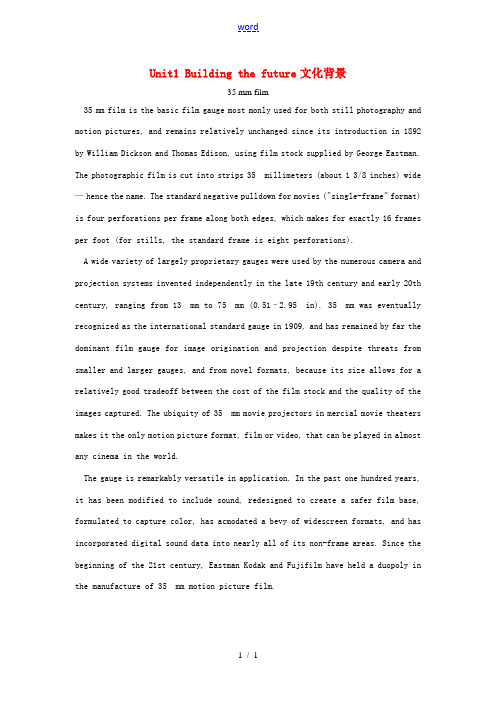
wordUnit1 Building the future文化背景35 mm film35 mm film is the basic film gauge most monly used for both still photography and motion pictures, and remains relatively unchanged since its introduction in 1892 by William Dickson and Thomas Edison, using film stock supplied by George Eastman. The photographic film is cut into strips 35 millimeters (about 1 3/8 inches) wide —hence the name. The standard negative pulldown for movies ("single-frame" format) is four perforations per frame along both edges, which makes for exactly 16 frames per foot (for stills, the standard frame is eight perforations).A wide variety of largely proprietary gauges were used by the numerous camera and projection systems invented independently in the late 19th century and early 20th century, ranging from 13 mm to 75 mm (0.51–2.95 in). 35 mm was eventually recognized as the international standard gauge in 1909, and has remained by far the dominant film gauge for image origination and projection despite threats from smaller and larger gauges, and from novel formats, because its size allows for a relatively good tradeoff between the cost of the film stock and the quality of the images captured. The ubiquity of 35 mm movie projectors in mercial movie theaters makes it the only motion picture format, film or video, that can be played in almost any cinema in the world.The gauge is remarkably versatile in application. In the past one hundred years, it has been modified to include sound, redesigned to create a safer film base, formulated to capture color, has acmodated a bevy of widescreen formats, and has incorporated digital sound data into nearly all of its non-frame areas. Since the beginning of the 21st century, Eastman Kodak and Fujifilm have held a duopoly in the manufacture of 35 mm motion picture film.1 / 1。
译林牛津版选修十 Unit1 Building the future workbook精品课件

catch up on some sleep this weekend.
Part D4 (Page 98 ) 1. I have been staying up till midnight since
Monday, working on my paper. I need to
Monday, working on my paper. I need to
catch up on some sleep this weekend.
2. Some young women put pressure on themselves to go on a diet in order to keep slim.
• workbook
Unit 1
Language practice Part A1 (Page 94)
1 beyond/without 4 in
7 on 8 behind
2 in 5 for
9 at
3 with 6 at
10 to
Part A2 (Page 94)
1 politician 4 expenses 7 conventional 2 loaves 5 electricity 3 agency 6 oxen
6. Burning coal for energy contributes a lot to environment pollution. On top of that, it is very dangerous to work in coal mines. 7. Recently , this terrible traffic accident has made the headlines, setting alarm bells ringing. 8. It is the responsibility of every one of us present to come up with a systematic way to put the plan into practice.
牛津译林版选修十unit 1《building the future

• 科技的发展使我们得以储存、传送 水电资源以便供不靠近水能源的人 们使用。
6
• What advantages do alternative energy sources have?
• Renewable, without running out and environmentally--friendly.
5
• Translate the sentence. • Developments in technology have allowed
us to store and transmit hydroelectric power so that it can be used by people not near the power source.
It polluted the environment and wasted
natural resources.
2.Translate the sentence.
Sustainable development is long-term planning
which focuses on the environment and
Careful Reading
6-9
level 1 level 2 level 3
12 34 56
1
• Can you give any examples of renewable energy?
英语:unit1 《building the future》task教案(1)(译林牛津版选修10).doc

英语:Unit1 《Building the future》Task教案(1)(译林牛津版选修10)●Task Writing about developmentSkills building 1: identifying emotive languageAt the beginning of today’s class, I’d like to ask you a few questions. Please answer the questions, trying to us as many emotive adjectives as you can.1.--How do you find yesterday’s football match?--It was so exciting that I couldn’t help shouting all the time.2.--What do you think of the film ?--It’s very boring.3.--How was your trip to Europe?--It was amazing. The scenery couldn’t be any better.From the examples above, we can see that the emotive adjectives can help us understand the speaker’s feelings. Besides this, what other things can help us understand the speaker’s feelings? That’s what we will discuss today. A fter that, we’ll learn to identify emotive language, Emotive language can help us better understand how the speaker feels about a situation.Read the three points on Page 10. Pay attention to the common emotive language signals when conducting an interview.Step 1: asking about life in the past:1. Now, let’s listen to a conversation of an interview and finish Part A on Page 10.TapescriptStudent: Do you think that our town has changed over the years, Grandfather?Grandfather: Yes, of course. There have been a lot of changes.Student: Can you give me an example?Grandfather: Well, the way that I go from one place to another has changed. When I was younger, I walked or rode my bike to school. I remember that my hands and feet were as cold as ice in winter. Now, I takebuses and taxis because my legs are weak. I feel like I could sleep for a hundred years after I walklong distances now.Student: What were the buildings like?Grandfather: In the past, there weren’t as many buildings as there are now,and they weren’t very tall. The townhad a lot of small houses and just a few shops. Wangji Shoe Shop has been there since I was achild.Student: What was the biggest building back then?Grandfather: I suppose it was the school.Student: What do you think about the buildings today?Grandfather: We have more and more tall buildings today. I like the changes because they show our town’s growth and development. My favourite building is the new department store. It’s as big as a mountainand is a wonde rful place to shop. It’s far bigger than the old school.Student: What kind of jobs did people have here?Grandfather: A lot of people were involved in the fishing industry, and I was, too. Did I tell you?I once caught a fish as big as a whale!Student: Is the fishing industry still big here?Grandfather: It’s not so big any more, but the tourism industry is growing. A lot of new restaurants have also opened, and the catering industry is doing well.Student: What about the environment? Has it been affected by development?Grandfather: I remember the fresh air and blue sky of my youth, but today, the environment is in a terrible state.The sea is full of rubbish and the air is polluted. It’s awful.Student: Grandfather, do you think that the changes in the town have been good?Grandfather: I think that most of the changes are good. We must be careful, though, todevelopour town while also taking care of the environment.AnswersA (1) walked or rode a bike(2) bus(3) taxi(4) small houses(5) school(6) new department store(7) fishing(8) tourism(9) catering(10) fresh(11) rubbish(12) polluted2. Now study the emotive adjectives in the left column of the table in Part B and then complete the right column with the missing words.3. Now listen to the monologue in Part C and take notes on the note.TapescriptGrandfather: Yes, I remember now. This newspaper report is about the shopping centre that opened near Shells Beach when I was a young man. The centre is still there today. It was a very good idea, if you ask me. It created jobs for many people at the time. It allowed many new restaurants to open, which was good for people working in the catering industry. My favourite restaurant was a seafood restaurant on the top floor, but it is no longer there. My friend Gao Dahai, a famous seafood chef, used to work there, and my younger cousin worked as a waiter there. Another good thing about the shopping centre was that they opened several clothing shops that sold things made by local designers. Your grandmother Fang Yi used to design belts and handkerchiefs for one of them. She once forced me to be a model for a fashion show raising money for a local charity! I also remember going to a local book club at the Bookworm Bookshop in the shopping centre. Authors from around the area used to sign their books for readers. I think that this shopping centre also helped support the publishing industry a lot. Although there were only a few travel agencies, a tourist information office opened soon after the grand opening of the shopping centre. That was good because many tourists came to visit, and the tourism industry in the town has developed a lot since then.More than anything else, I remember how this shopping centre helped people in the area, and it became my favourite place in town. It was wonderful.Skills building 2:discussing the probability of the future1.Group work: Discussion: What will the world be like in a hundred years?2. Read the guidelines on page12. Make sure that you know that the phrases listed show the level of certainty about a future event. And after that, try to present a dialogue in which you might use the phrase and expressions taught in this part.Step 2: interviewing the City Development CouncilNow, let’s use the skills we just learned.1. Work in groups of four. Discuss the six questions in the left column of the table.2. Work in pairs. One acts as the official and the other as the student interviewing.Possible exampleStudent: Good morning, Sir. I would like to know something about the development of our town.Could I ask you a few questions about it?Official: Sure. I would be glad to help.Student: Do you think our town will become a major tourist attraction in the future?Official: Well, I am afraid it may not. There are not many places of natural beauty here.Student: Will our town continue to develop?Official: Yes, it will definitely continue to develop.Student: Do you think we will open more shopping centres?Official: We might do so.Student: Will the problem of pollution get worse?Official: Possibly it will, although we are trying to keep our town clean.Student: Will it be necessary for the fishing industry to carry out the sustainable development plan?Official: I think it will be necessary in the future to introduce this plan.Student: Will the fashion industry ever disappear from the town?Official: That is out of the question. It is likely to become a major industry in the future.Student: Thank you very much.Skills building 3: writing an essay1. Read the guidelines at the top of page 13.2. Group work: write an outline of an essay.Step 3: writing for the competition. 1. Read the instructions in Step 3 and then you are going to write an essay on the development of your town for the writing competition with the information you gathered in Step1 and 2.2. Work in groups and write an essay.Possible exampleOur town has changed a lot over the years. It is now developing into a modern city from an ld small town.In the past, the town only consisted of small houses and simple shops. Today, however, many tall buildings have been built as a result of the booming fishing industry, tourism industry as well as the equally successful publishing industry. Many new businesses have opened, which has created hundreds of new jobs for local people. According to an official at the City Development Council, our town will definitely continue to develop at a fast speed in the future.On the whole, as time goes on, there is no doubt that our town will take on a new look and finally become a modern city.Homework:Complete the notes on page 104 in Workbook .。
【牛津译林版】选修10:Unit1 Building the future Word power课件
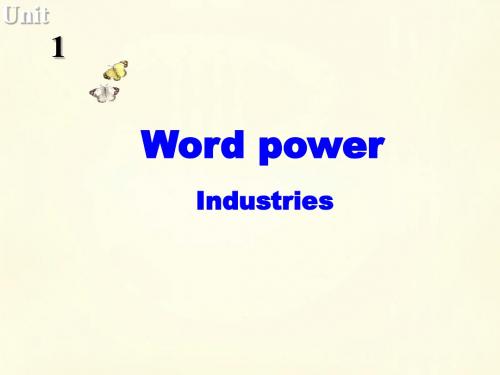
Brainstorming
What does your father/mother do?
(write down the answers on the blackboard)
Can you put all the occupations into different categories?
Reading
waiter /waitress cook/chef editor; writer
Fashion including people industry working with clothes, from designing to making and even modeling them IT one of the fastest growing of all industries Tourism related to travel industry agencies and places of
Read the passage in Part A and fill in the table: Industry Description Occupation Constructio including people n industry working on building sites and producing building materials Catering referring to all industry business involving food and drinks Publishing involving engineer
improve 6. Their quality of life will __________ greatly with the addition of running water to their town.
牛津译林版选修十unit 1《building the future》word教案2
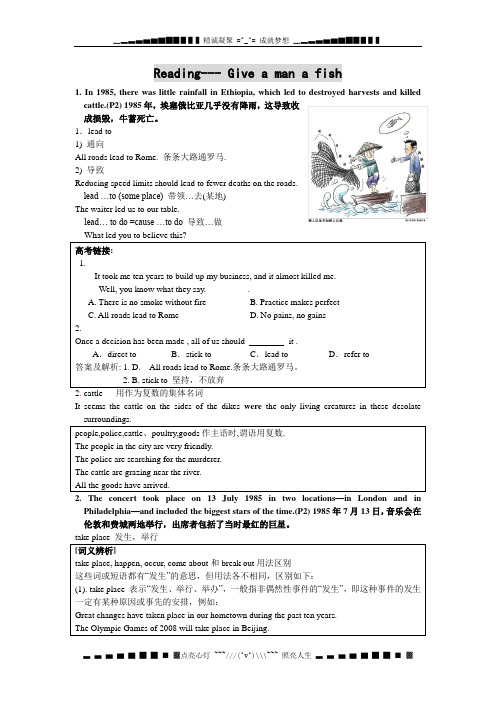
Reading--- Give a man a fish1. In 1985, there was little rainfall in Ethiopia, which led to destroyed harvests and killed cattle.(P2)1985年,埃塞俄比亚几乎没有降雨,这导致收成损毁,牛蓄死亡。
1.lead to1) 通向All roads lead to Rome. 条条大路通罗马.2) 导致Reducing speed limits should lead to fewer deaths on the roads.lead …to (some place) 带领…去(某地)The waiter led us to our table.lead… to do =cause …to do 导致…做2. cattle 用作为复数的集体名词It seems the cattle on the sides of the dikes were the only living creatures in these desolate2. The concert took place on 13 July 1985 in two locations—in London and in Philadelphia—and included the biggest stars of the time.(P2)1985年7月13日,音乐会在伦敦和费城两地举行,出席者包括了当时最红的巨星。
politicians and malnutrition.(P2)音乐会还受到了全世界的极大关注,这给政客们施加了巨大压力,迫使他们为这次饥荒做一些事情。
put pressure on 给…施加压力Do not put much pressure on the handle, it may break.不要在把柄上太用力了,它会坏的。
- 1、下载文档前请自行甄别文档内容的完整性,平台不提供额外的编辑、内容补充、找答案等附加服务。
- 2、"仅部分预览"的文档,不可在线预览部分如存在完整性等问题,可反馈申请退款(可完整预览的文档不适用该条件!)。
- 3、如文档侵犯您的权益,请联系客服反馈,我们会尽快为您处理(人工客服工作时间:9:00-18:30)。
2021牛津译林版选修十unit1《buildingthefuture》word教案●Period 1 Welcome to the unitTeaching aims:1.Get to know something about the development of the world, the issue of poverty, the causes ofpoverty as well as the possible solutions to the problem;2.Practise listening and speaking by sharing information;3.Get ready for the learning of this unit.Teaching procedures:Step 1 BrainstormingThe teacher begins the lesson by asking students to find out the causes of poverty and the possible solutions to the problem by means of pair work.【设计说明】教师通过学生头脑风暴活动进入本单元的主题“Building the future”。
Step 2 Pair workAsk students to look at the four pictures and discuss questions according to the each picture.【设计说明】利用图片关心学生结合自身的经历和生活体会展开两人活动,培养了学生的听说能力。
Step 3 Group discussionAsk students to find out the great changes that have taken place in Wuxi, where they are living and studying so that they will care more about their hometown and try their best to learn more knowledge to serve the hometown in the future.【设计说明】教师让学生通过小组讨论,谈谈他们生活和学习的都市无锡的庞大变化,真正做到学以致用,把发生在周围的情况用英语表达出来,做到了“Localization”。
从而通过小组讨论培养学生合作学习的能力。
●Period 2 Reading (1)Teaching aims:1.Try to help Ss know something about the poverty in developing countries and the way to helpthem solve the problem;2.Try to cultivate Ss’ abilities in listening、speaking、reading and writing;3. Help Ss master the reading strategy: understanding a title.Teaching procedures:Step 1 IntroductionThe teacher begins the lesson by asking students to say something about the title.【设计说明】作为文章的导入,为阅读明白得做好热身预备。
Step 2 ScammingAsk students to try to find out the answers to the three questions in a very short time without finishing reading the whole text.【设计说明】培养学生快速阅读技能,不需要通读全文就能找到答案。
Step 3 Silent readingAsk students to read the passage carefully, trying to find out the main idea of each paragraph, finish the true or false questions and answer all the seven questions.【设计说明】有目的地默读,关心学生查找信息。
Step 4 ComprehensionAsk students to finish the true or false questions and answer all the seven questionsHow many people are quoted in the article?【设计说明】检查学生的明白得成效。
Step 5 Listening and readingAsk students to listen to the tape and read after it so that the students will have a better understanding of the text.【设计说明】在课文明白得完毕的基础上听读课文,不仅能更好地明白得课文,而且训练了学生的听读能力。
Step 6 Reading strategy: understanding a titleHelp students to master the reading strategy: understanding a title【设计说明】关心学生把握阅读策略,如何样明白得文章题目。
Step 7 SummaryAsk students to fill in the blanks according to what they have learned form the passage.【设计说明】这也是检查学生明白得成效的一种重要手段,同时也培养了学生写的能力。
Step 8 Group discussionAsk the students talk about the two topics by working in groups.【设计说明】这是阅读明白得课的最高层次,培养学生的听说能力及发散思维能力和制造能力。
Step 9 HomeworkAsk the students to write a 150-word passage about either of the two topics.Period 3 Reading (2)Teaching aims:1. Learn the language points in the passage.2.Practice listening、speaking and writing.Teaching procedures:Step 1 Learn the new language points1. shockv. 震动、震动 A. sth. shock sb. B. sb. be shocked (to do) C. sb. be shocked that…A great number of people in the world are suffering from hunger, which greatly shocks us.=We are greatly shocked that a great number of people in the world are suffering from hunger.=We are greatly shocked to learn that a great number of people in the world are suffering from hunger.n. 震动、冲突、震动A great number of people in the world are suffering from hunger, which is a great shock to us.It gives us quite a shock to learn that a great many people in the world are suffering from hunger.2. intend v.A. sb. intend to do sth. 打算做某事What do you intend to do this Sunday?I intended to visit you lat night but it rained.B. sb. intend sb.to do sth. / sb. be intended to do sth. /sb. intend that…打算让某人做某事They intend their son to take over the company.=Their son is intended to take over the company.=They intend that their son will take over the company.C. sb. intend sth. as sth. =sth. be intended as sth.sb. intend sth. for sb. =sth. be intended for sb.sb. intend sth. for sb. as sth. =sth. be intended for sb. as sth.Mother’s day was coming. Tom bought some flowers for his mother as a gift in honor of his mother.Tom intended the flowers as a gift.=The flowers were intended as a gif.Tom intended the flowers for his mother.=The flowers were intended for his mother.Tom intended the flowers for his mother as a gift. =The flowers were intended for his mother as a gift.The joke, intended (intend) to please the audience, turned out to be very boring.3. doubt1) doubt sb. / sth.Sarah doubted Hannah.Sarah doubted Hannah’s honesty.2) doubt whether / if…There is some doubt whether / if…Sb. has doubts whether / if…Sarah doubted whether Hannah was honest.There was some doubt whether Hannah was honest.Sarah had her doubts whether Hannah was honest.3) don’t doubt that…There is no doubt that…Sb. has no doubt that…We don’t doubt that Mary is diligent and intelligent.There is no doubt that Mary is diligent and intelligent.We have no doubt that Mary is diligent and intelligent.4) no doubtNo doubt that good friends should share in joys and troubles.No doubt that Mary has set us a good example.5) without doubt :毫无疑问, 一定地Don’t worry; he’ll come back without doubt.Without doubt you have been working very hard.4. on top of =in addition; besidesHe had a bad week. He lost his job, and on top of that, his car was stolen.on top of the world = extremely happyWhen I heard that she had been released, I felt on top of the world.5.be dependent on sb / sth. =depend on /count on / rely on 依靠、依靠The country is heavily dependent on its exports of agricultural commodities.=The country heavily depends on / counts on/ relies on its exports of agricultural commodities. The elderly may seek their own friends rather than become too emotionally dependent on their children.6. riskA. at risk : 处于危险之中The disease is spreading, and all children under five are at risk.Is the Government’s income policy seriously at risk?Heart disease can be avoided if people at risk take medical advice.B. at the risk of …冒······的危险At the risk of catching the fever himself the man kindly carried the sick child home.He was determined to get there even at the risk of his life.C. run/ take the risk of 冒的······危险, 做某件危险的事I was afraid to run the risk of betting on the game.He was ready to run / take the risk of being taken prisoner by the enemy.D. vt. 冒······的危险,拿冒······险The brave man risked his life in trying to save the child.We mustn’t risk getting caught in a storm.【设计说明】在语言点的操练过程中能够采纳中译英、句型转换、情形设置等方法关心学生明白得文中显现的语言现象,把握新的语言知识。
